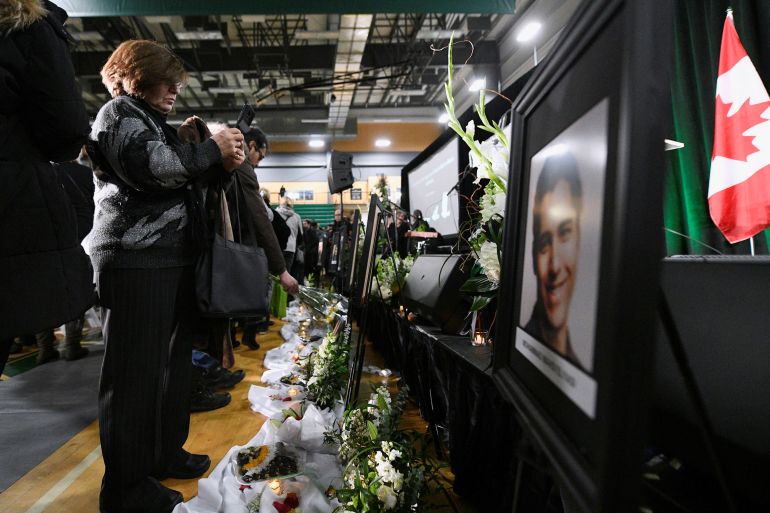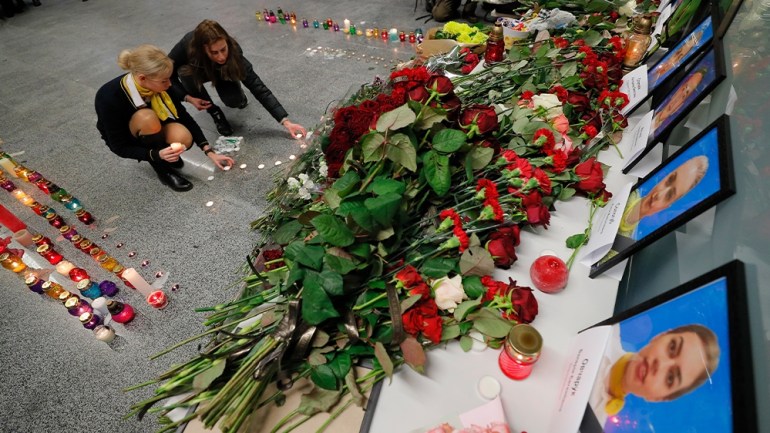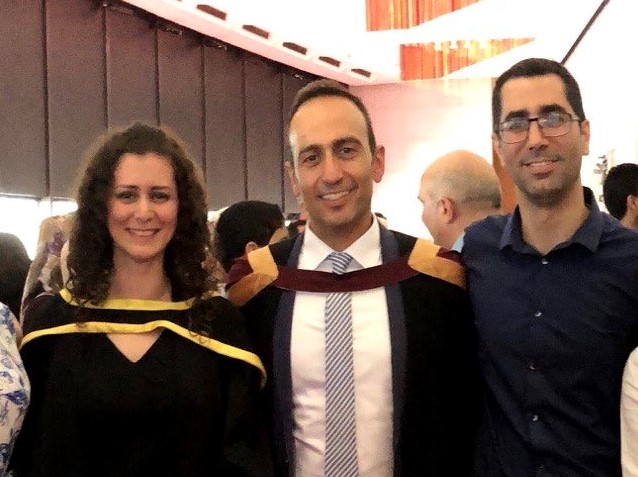Search for answers continues one year after Iran plane crash
Loved ones of Ukrainian Airlines Flight PS752 victims say mourning continues on anniversary of the plane’s deadly downing.

Montreal, Canada – “Is it real?”
That is the text message Ali Dolatabadi remembers getting in the morning of January 8, 2020, just hours after Ukrainian International Airlines flight PS752 was shot out of the sky near Tehran, killing all 176 people on board.
Keep reading
list of 3 items‘Funeral for public trust’: New crisis in Iran after plane crash
‘The only thing that can comfort me now is justice’
Dolatabadi, an engineering professor at Concordia University in Montreal, Canada, more than 9,000km from the crash site, said he could not believe the initial Iranian news reports of what had happened.
But Dolatabadi’s disbelief quickly turned into sorrow when he confirmed that two former engineering students at the Canadian university – Siavash Ghafouri-Azar and his wife, Sara Mamani – were among those killed. The pair had gone to Iran to get married.
“That was tough, very tough days and weeks. Still, it’s not easy to imagine,” Dolatabadi told Al Jazeera in a phone interview last month. “The problem also is still nobody knows exactly what happened.”
The Ukrainian International Airlines flight bound for Kyiv went down shortly after takeoff from Tehran’s Imam Khomeini International Airport on January 8, a time of heightened tensions between Iran and the United States.
Iran’s military had just fired missiles on US forces in Iraq in retaliation for the assassination of Iranian General Qassem Soleimani, who was killed in a January 3 US strike on Baghdad airport that was ordered by President Donald Trump.
After Iran initially denied any involvement, the Revolutionary Guards said they shot down the airliner by accident after mistaking it for a missile.
On December 30, the Iranian government pledged to pay $150,000 to each of the victims’ families. Iranian roads minister Mohammad Eslami also said a thorough government report into the incident had been finalised and submitted to all stakeholders.
Negotiations
The deadly crash sent shockwaves around the world.
Many of the victims had connections to Canada, where the devastation in the immediate aftermath of the incident was palpable. Fifty-five passengers were Canadian citizens, 30 were Canadian permanent residents, and dozens more were studying and working in the country. Large vigils were held in Canadian cities and fundraisers were organised to support the victims’ families, while Prime Minister Justin Trudeau’s government promised to get to the bottom of what happened.
Following the crash, the PS752 victims’ countries – Canada, Ukraine, the UK, Sweden and Afghanistan – banded together to push for answers and accountability. Under the banner of the International Coordination and Response Group, Kyiv has taken the lead in negotiations with Tehran for a thorough investigation and for compensation for victims’ families.
“They are trying to negotiate as a united front to make sure that no victim is left behind, that all victims are treated equally under the negotiations,” Amanda Ghahremani, an international criminal lawyer based in Canada, told Al Jazeera before the Iranian government’s announcement.
Ghahremani said Ukraine was the right choice to lead the talks because the plane was a Ukrainian aircraft and Ukraine has the best relationship with Iran of all the countries involved.
The crash worsened an already fraught relationship between Ottawa and Tehran, which have not had diplomatic ties since 2012. Canadian and Iranian leaders have traded barbs during the course of the investigation, with Iran’s foreign ministry spokesman Saeed Khatibzadeh accusing Canada this month of exploiting families’ grief and politicising the process.
A recent report by Trudeau’s former foreign affairs minister, Ralph Goodale, into the crash also found that “many of the key details” of what happened remain unknown to the Coordination Group countries and victims’ families – and put the blame squarely on Iran, fuelling tensions.

“Iran bears responsibility for that because – at least thus far – it has not conducted its investigations (safety, criminal or otherwise) in a truly independent, objective and transparent manner; and answers to critical questions have not been forthcoming,” the report reads.
Other avenues
In an email to Al Jazeera, Canada’s Minister of Foreign Affairs Francois-Philippe Champagne said obtaining reparations from Iran includes both compensation for the victims’ families and “an accounting of the events”.
“To date, discussions between the CG countries and Iran have been in relation to the structure and modalities of future negotiations. No other negotiations or meetings have taken place and no formal offers have been made by Iran to the CG countries,” Champagne said.
He said reparations would be determined “in accordance with international law through multilateral negotiations between the CG countries and Iran”.
Other avenues for redress and accountability exist beyond the negotiations, as well.
They are trying to negotiate as a united front to make sure that no victim is left behind, that all victims are treated equally under the negotiations
Ghahremani is a consulting lawyer to the law firm Camp Fiorante Matthews Mogerman, which represents several victims’ families seeking compensation from Ukrainian Airlines. She said these claims against the airline are “a more immediate avenue for getting some form of compensation”.
The families have argued that the airline can be held liable under international conventions. Depending on the passengers’ itinerary, their deaths could be covered by either the Montreal Convention or its predecessor the Warsaw Convention, both enacted into Canadian law.
“It’s hard for families to have the bandwidth or the energy to try to think through compensation when that is clearly not going to be adequate for the loss that they’ve suffered – and that’s understandable,” Ghahremani said.
“Nothing that we can try to accomplish in terms of justice is going to bring back the lost loved ones. But I think that it’s important for grieving families to know that this is an option that they have available.”
International court
Others, meanwhile, have been pushing for an international judgement against Iran.
Fred Farhat Soofi, a human rights activist in the Vancouver area who is originally from Iran, said that is what he and other members of the community “are looking for [the] Canadian government to take them to international human rights court”.
Soofi, who knew one of the victims who died on Flight PS752, told Al Jazeera in a phone interview in December that “[there] won’t be closure until there is some type of international judgement against” Iran.

“Everybody was shocked,” Soofi said about the immediate aftermath. “It was something you couldn’t believe.”
Affected countries can file a case against Iran at the International Court of Justice, the United Nations’ top court, to seek reparations. They would need to argue that the downing of the flight was a violation of international law.
National authorities can also pursue criminal investigations, but Ghahremani said this process is complicated and restrictive. In Canada, for instance, prosecutors will not start an investigation without first having a suspect on their territory.
She said each of the options is ultimately “contingent on how the factual investigation proceeds and what information is uncovered” about the crash. “Unfortunately, the barriers to the evidence are a big problem, but we just have to wait and see how things evolve.”
Mourning continues
Meanwhile, families are still in mourning one year after the crash.
Dolatabadi, who went to school with Ghafouri-Azar’s uncle two decades ago in Toronto and also knows his former student’s father, said the family remains devastated. “It takes time,” he told Al Jazeera. “Really, one year is nothing for such a big disaster.”
He said he personally takes solace in efforts to remember and honour the victims, such as new Concordia University engineering scholarships for Iranian master’s students that have been named after Ghafouri-Azar and Mamani.
“They’re gone, but we can keep their spirits [alive within] ourselves – just remembering them.”